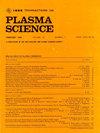Surface Structuring of Zirconium by Thermal Plasma Treatment
IF 1.3
4区 物理与天体物理
Q3 PHYSICS, FLUIDS & PLASMAS
引用次数: 0
Abstract
The thermal plasma setup was designed, fabricated, and successfully established. The effects of thermal plasma treatment on the surface morphological, compositional, electrical, mechanical, and wettability properties of zirconium (Zr) have been investigated. The Zr targets were treated with atmospheric Ar thermal plasma at different Ar flow rates ranging from 10 to 25 L/min and under different treatment times starting from 10 to 25 min. Scanning electron microscope (SEM) and optical analyses reveal the growth of various kinds of surface structures, such as microrods, flakes, pores, cracks, dendrites, agglomerates, and ridges on treated Zr. This growth is explainable on the basis of ion-induced localized heating, melting, collisional sputtering, Coulomb explosion, and thermal spike model. It was observed that both the size and number density of flakes decrease from 8 to 5热等离子体处理锆的表面结构
设计、制作并成功建立了热等离子体装置。研究了热等离子体处理对锆(Zr)表面形貌、组成、电学、力学和润湿性的影响。在10 ~ 25 L/min的氩气流速和10 ~ 25 min的不同处理时间下,用常压氩气热等离子体处理Zr靶材。扫描电镜和光学分析显示,处理后的Zr表面生长有微棒、片状、孔隙、裂纹、枝晶、团聚体和脊状等多种表面结构。这种增长可以用离子诱导局部加热、熔化、碰撞溅射、库仑爆炸和热尖峰模型来解释。结果表明,随着氩流量的增加和处理时间的延长,薄片的尺寸和密度分别从8 ~ 5 $\mu \text{m}$和87\ × 10^{6}$降低到37\ × 10^{6}$ cm $^{-2}$。傅里叶变换红外(FTIR)和x射线衍射(XRD)分析表明,Ar等离子体后Zr的成分没有变化。然而,观察到微晶尺寸和位错线密度的微小变化。处理后锆的导电性降低,硬度和润湿性提高。
本文章由计算机程序翻译,如有差异,请以英文原文为准。
求助全文
约1分钟内获得全文
求助全文
来源期刊

IEEE Transactions on Plasma Science
物理-物理:流体与等离子体
CiteScore
3.00
自引率
20.00%
发文量
538
审稿时长
3.8 months
期刊介绍:
The scope covers all aspects of the theory and application of plasma science. It includes the following areas: magnetohydrodynamics; thermionics and plasma diodes; basic plasma phenomena; gaseous electronics; microwave/plasma interaction; electron, ion, and plasma sources; space plasmas; intense electron and ion beams; laser-plasma interactions; plasma diagnostics; plasma chemistry and processing; solid-state plasmas; plasma heating; plasma for controlled fusion research; high energy density plasmas; industrial/commercial applications of plasma physics; plasma waves and instabilities; and high power microwave and submillimeter wave generation.
 求助内容:
求助内容: 应助结果提醒方式:
应助结果提醒方式:


